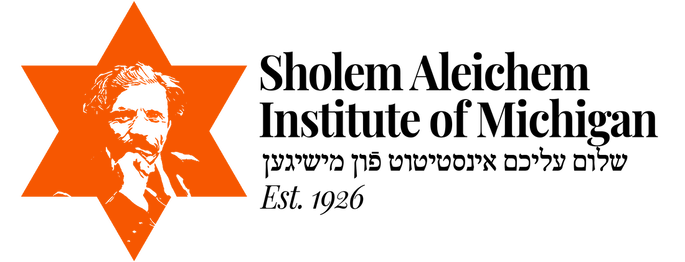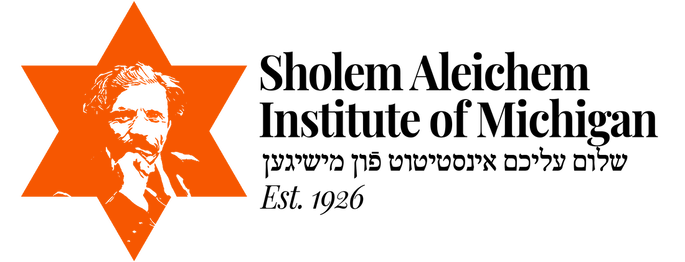Beginnings
The Sholem Aleichem Institute of Michigan began its life in 1925 as the Yidishe Folkshule Farein (Yiddish People’s School Organization), a project between different ideological groups in Detroit to provide American-born, English-speaking Jewish children with a secular Yiddish education outside the religious Jewish establishment. With a particular focus on pride in Jewish history and in Yiddish’s vast literary culture, diasporic Yiddishists, labor-Zionists, and more came together to establish a “‘Cultural Center for adults, a home for the youth and a school for the children.’” Money was raised to purchase a house for this organization in 1926 at 539 Kenilworth Street. In time, this building would be expanded and rebuilt to host a kindergarten, a Tealig (Theatre League), and an assembly hall called the Kinder Teater (Children’s Theater) for all manner of cultural events.
Educators Moishe Haar, Chaim Pomeranz, and Chaim Bendore were some of the earliest teachers to make their mark on the community, developing a school program that would become so large - from nursery to high school! - that they would expand to branches on Fenkell Street, 12th Street, and Monterey. They were joined in 1927 by Shloime Bercovich, formerly of the Sholem Aleichem Institute in New York, who was the organization’s very first director. For a time, the organization took on the name Umparteishe Folk-shul Geselshaft (Non-Partisan People’s School Community), a reflection of their desire to work past ideological disputes among members. By 1929, the organization was renamed the Sholem Aleichem Institute.
Educators Moishe Haar, Chaim Pomeranz, and Chaim Bendore were some of the earliest teachers to make their mark on the community, developing a school program that would become so large - from nursery to high school! - that they would expand to branches on Fenkell Street, 12th Street, and Monterey. They were joined in 1927 by Shloime Bercovich, formerly of the Sholem Aleichem Institute in New York, who was the organization’s very first director. For a time, the organization took on the name Umparteishe Folk-shul Geselshaft (Non-Partisan People’s School Community), a reflection of their desire to work past ideological disputes among members. By 1929, the organization was renamed the Sholem Aleichem Institute.
Expansion
The school continued to flourish in spite of the Great Depression, helping lay the foundations for participants of all ages. Moishe Haar founded Detroit’s first Women’s Yiddish Reading Circle in 1926, which later developed into a proper Women’s Institute, helmed by Ida Kamaroff. In 1931, a set of officers was elected, including the Institute’s first president, Isaac Finkelstein. With a busy school, formal leadership, and parents eager to fundraise, the organization expanded with bazaars, rummage sales, concerts, picnics on Belle Isle, restaurant days, and academic lectures. The Tealig expanded to include talented students from among all Yiddish schools in Detroit, and the high school later joined forces with the Workmen’s (now Worker’s) Circle and the Farband to teach classes, celebrate Hanukkah, and host a combined graduation ceremony for Yiddish schools.
Article by Hannah Mills
Why Sholem Aleichem?
Sholem Aleichem (1859-1916), born Shalom Rabinovitz, is considered one of the founding fathers of modern Yiddish literature. His characteristic satirical humor and vibrant characters, such as Tevye the Dairyman and Motl the Cantor’s Son, are enduring cultural touchstones in Yiddish and Jewish culture.
Learn more about Sholem Aleichem himself here:
Eugene Driker, a Sholem Aleichem Institute Board Member and former chair of the Yiddish Book Center's Board of Directors, shares his experience of growing up as part of the
Sholem Aleichem Institute in Detroit in the 1930s and 40s.
Sholem Aleichem Institute in Detroit in the 1930s and 40s.
More Oral Histories:
|
|
|


